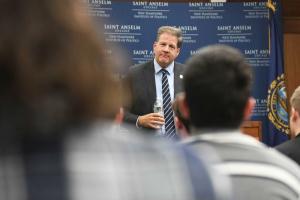*Please note: This article is a student blog written by a Kevin B. Harrington Student Ambassador. The Ambassador Program is a unique opportunity for Saint Anselm College students of any major to be involved in supporting the Institute's various events and activities. To learn more about our student ambassadors please visit the NHIOP website.
On Monday, October 23rd, the New Hampshire Institute of Politics (NHIOP) welcomed New Hampshire Governor Chris Sununu for another installment of the Common Ground series focused on bridging the divide that political polarization presents in our modern political climate.
To begin the Common Ground event, Governor Sununu made remarks focusing on his experience governing the Granite State and what makes New Hampshire different. The high political participation rate, he told the audience, is a natural byproduct of a government that serves its constituents effectively. He focused on the accessibility and volunteerism present in the New Hampshire legislature, officially called the General Court, and in local towns and cities. In these open channels of communication, Sununu said, were unlimited opportunities for citizens and constituents to contact their legislators and executive officials. On the other hand, personal privacy of elected officials and the respect that the Governor said Granite Staters have regarding it was applaudable. Sununu chalked this respect up to a mutual understanding that the citizens of New Hampshirites have a say in their government, and that government works for the citizenry.

The First in the Nation presidential primary was also examined in Sununu’s remarks. He mentioned that every candidate, at least in the Republican field, has a true shot in New Hampshire and how that cannot be said for every state. The role of retail politics became a frequent observation of Sununu’s, especially watching candidates from all over the country compete for support from the voters.
Sununu explained the New Hampshire tradition of putting the person before their party. Focusing on how party infrastructure plays less of a role in New Hampshire than in other states, he remarked that in Washington, the chaos regarding the Speaker of the House of Representatives cannot be found in the N.H. House of Representatives, despite the latter’s closer partisan divide.

When the floor was opened to questions from students, Sununu fielded inquiries about the two-party system, the role of social media in the polarization of politics, and how polarization can be reversed.
On the two-party system, Sununu gave three explanations to the problems presented by the factionalism found in the two-party system: poor campaign finance laws, extreme gerrymandering, and a lack of term limits. On campaign finance laws, Sununu pointed to New Hampshire’s transparent system and contrasted it with the outside money raised for federal elections. He also struck at the far-right Freedom Caucus members fundraising off the chaos they created surrounding the vacant speakership in the House of Representatives. Gerrymandering was a point Sununu discussed more in depth. He mentioned the lack of federal rules surrounding the practice. Attacking the notion of “safe” districts, the Governor cautioned against districts drawn where candidates are more worried about a primary election than the general election. The last point Sununu touched on when answering this question was the lack of term limits for Congress. He charged some members of the House and Senate with “overstaying their welcome” and turning what should be definite professions of public service into lifelong careers.

Social media became a frequent target of Sununu’s. After asking the audience what their most used social media app was, the overwhelming majority answered Instagram, he listed the different apps and who uses them for what purpose. His characterization of Facebook as the app where fifty-year-olds “complain from their parents’ basements” drew laughter from the audience, as did his admission that his children took his Snapchat away from him. Engaging with members of the audience, the discussion turned towards the role of algorithms in shaping the individual's use of social media and how the addictive and vacuum-like properties of it draw people further and further to their respective partisan camps. Misinformation was also brought up by the audience and how opinions were reaffirmed on the more partisan news outlets of CNN, MSNBC, Fox, and Newsmax. Sununu explained his opinion that the best times of day to watch the news were between midday and seven to eight o’clock.
Closing out the Common Ground was a discussion on how to reverse political polarization. Sununu’s comments focused on how students could get involved in politics, though he cautioned not to make it a career. He pointed to students running for local office and state representative. After being asked how the $100 a year salary New Hampshire state representatives draw is a benefit and not a barrier, he told the questioner that it was a give and take. The legislature balances the expertise in many cases, and ease of access with a lack of professionalism and time commitments compared to compensation. When a follow-up question was asked about barriers to campaigning, the Governor explained state representatives only represent around thirty-five hundred people. At times, it can be as simple as knocking on doors, but Sununu recommended paying for signs and posters to win votes.
This Common Ground with the Governor proved to be successful and respectful. Students left the conversation engaged and educated. After the event, Sununu took pictures outside with Saint Anselm students.
